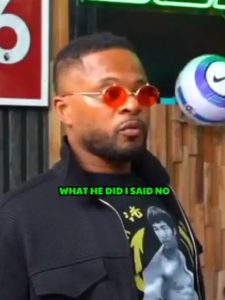
Evra Says Nasri Regretted Snubbing Manchester United for City Move
In the ever-evolving world of football transfers, few decisions linger in the public imagination quite like those that could have altered the trajectory of a player’s career—and, perhaps, even the fortunes of rival clubs. One such case has resurfaced in recent days, as former Manchester United captain Patrice Evra claimed that ex-France international Samir Nasri regretted turning down a move to United in favor of Manchester City during the summer of 2011.
Evra, speaking on a recent football podcast, suggested that Nasri privately expressed remorse over the decision in later years, hinting at what might have been had the former Arsenal midfielder joined Sir Alex Ferguson’s legendary side instead of their noisy neighbors. The revelation has sparked new discussion among fans and pundits alike, reopening an old chapter from the intense Manchester rivalry during the early 2010s.
The Transfer That Shook North London
In 2011, Samir Nasri was at the peak of his powers. A dazzling creative force for Arsenal, Nasri had enjoyed his best campaign yet during the 2010–11 season, scoring 15 goals in all competitions and earning a place in the PFA Team of the Year. The then 24-year-old had just one year remaining on his contract, and with Arsenal once again falling short in their pursuit of silverware, top clubs began circling.
Manchester United and Manchester City were the front-runners in the race for his signature. United, managed by the legendary Sir Alex Ferguson, had just secured another Premier League title and were looking to refresh a squad that had reached the Champions League final that year. Ferguson personally admired Nasri’s technical ability and saw him as a natural addition to his midfield.
However, City—fuelled by new wealth and a burning ambition to usurp United—were prepared to offer a more lucrative contract and guaranteed a leading role in their project. Ultimately, Nasri opted for the Etihad over Old Trafford, a move that prompted significant backlash from Arsenal supporters and caused waves across the Premier League.
Evra Opens Old Wounds
Now, nearly 14 years later, Evra’s comments have reignited the debate surrounding that pivotal transfer. Speaking candidly on The Vibe with Five podcast, Evra said:
> “I remember clearly when Nasri had the choice between Manchester United and City. I spoke to him personally, and he knew what United could offer—not just on the pitch, but the environment, the culture, and playing under a manager like Sir Alex. Later, he admitted to me that he regretted not choosing United.”
Evra, who captained United during that era and was a close friend of Nasri from their time in the French national team, implied that the allure of financial rewards and City’s rising status clouded Nasri’s decision. The implication was clear: had Nasri chosen the red side of Manchester, he may have found a deeper sense of fulfillment and long-term success.
Nasri’s Time at City
To be fair, Nasri enjoyed a relatively successful spell at Manchester City. He won two Premier League titles (2011–12 and 2013–14), an FA Community Shield, and a League Cup during his six-year stint at the Etihad. He scored memorable goals, most notably in the title-winning 2011–12 campaign, and often featured in key matches under managers Roberto Mancini and Manuel Pellegrini.
However, his time at City wasn’t without its challenges. Injuries, dips in form, and inconsistent playing time plagued the latter years of his stay. Nasri never quite reached the consistent elite level many had expected after his Arsenal performances. Eventually, he was loaned out to Sevilla and later left City permanently, beginning a career decline that saw him play for clubs like Antalyaspor, West Ham, and Anderlecht before retiring prematurely in 2021.
Looking back, while the trophies at City were a major accomplishment, many believe that Nasri’s career didn’t fully live up to its potential. Under Ferguson at United, some argue he may have been more disciplined, more consistent, and perhaps part of an even greater legacy.
What Could Have Been
At Manchester United, Nasri would have joined a squad still brimming with talent and winning culture. With players like Wayne Rooney, Ryan Giggs, Paul Scholes, and a young David De Gea, United were a team still dominating English football. Ferguson’s ability to extract the best from mercurial talents—such as Cristiano Ronaldo, Carlos Tevez, and Dimitar Berbatov—suggests that Nasri could have blossomed even further under his guidance.
Moreover, United’s midfield at the time was undergoing transition. The likes of Anderson, Tom Cleverley, and Darren Fletcher were all being rotated, and Nasri would likely have had a more central, pivotal role. There’s every chance he could have become a long-term fixture in the squad, with a career shaped by stability and tactical development under Ferguson’s tutelage.
A Missed Legacy?
Perhaps what Evra’s comments really highlight is not a lack of trophies in Nasri’s cabinet, but a missed opportunity to be part of something more enduring. City, while now a modern-day juggernaut, were still establishing their identity during Nasri’s time. The club’s infrastructure, culture, and fan connection were still evolving. In contrast, United offered history, tradition, and the mentorship of one of football’s greatest managers.
Ferguson’s retirement in 2013, just two years after Nasri’s move, might have changed that hypothetical trajectory. Still, for many, the decision to join City at a time when United was still a dominant force remains a “what if” moment—one that may have denied Nasri the chance to become a United great.
Nasri’s Perspective
Samir Nasri himself has commented on the transfer in past interviews, often defending his choice. He cited City’s ambition and the opportunity to be part of their historic title-winning team as key motivations. He also referenced a sense of freedom and respect given to him at City as a reason he preferred their project.
However, he has never publicly admitted to regretting the decision. Whether Evra’s claim is based on a private conversation or interpreted sentiment remains unclear. Regardless, it has fueled debate among fans and opened the door to further scrutiny of high-profile career moves in football.
Conclusion
Patrice Evra’s claim that Samir Nasri regretted snubbing Manchester United for City is more than just a casual revelation. It serves as a reminder of how career-defining these decisions can be. In football, as in life, choices are shaped by timing, ambition, and personal conviction—but hindsight often casts them in a different light.
While Nasri’s time at City brought success and silverware, the enduring legacy he might have carved at Old Trafford will remain one of football’s great hypotheticals. As fans look back on one of the Premier League’s most competitive eras, this revelation adds another layer to the rivalry—and a fascinating twist to
the story of two iconic clubs fighting for supremacy.

Leave a Reply